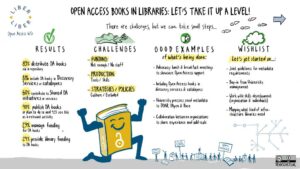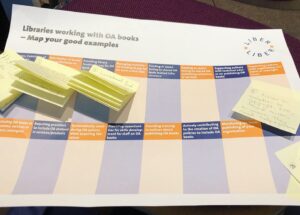Open Access Books in Academic Libraries: How Can We Adapt Workflows & Cost Management to an Open Scholarly Communications Landscape?
It is an exciting time for those working with the publishing of academic books. The topic of Open Access (OA) books is being widely discussed in many workshops and conferences, and there is growing recognition that scholarly output formats beyond academic journal articles must be included when discussing OA policies, funding and workflows.
Building on this momentum, LIBER’s Open Access Working Group held a workshop at LIBER 2019 on the topic of OA books in libraries. Two questions were at the heart of the session:
- How do we determine how libraries are currently working with OA books?
- What can be done to help libraries make more OA books available, and to raise the profile of these books?
The workshop was facilitated by Frank Manista (JISC), Olaf Siegert (ZBW) and Sofie Wennström (Stockholm University Press). The keynote speaker was Eelco Ferwerda (DOAB/OAPEN).
The main points from the workshop are presented in this post.
Keynote Presentation: ‘OA Monographs & the Role of Libraries’
Presented by Eelco Ferwerda (download slides)
- OA leads to innovation in book publishing, especially in terms of new collaborations and new infrastructure and services;
- The transition to OA has just begun – 16,700 OA books listed in DOAB and growing;
- New business models are being developed;
- Authors seem to support the idea that all future scholarly books should be OA but providing print options is still important for readers;
- Challenges include the infrastructure for metadata about OA books, like using DOIs for easy tracking and interoperability between systems;
- Communities need to support bibliodiversity and allow for multiple formats and other innovations in publishing;
- Libraries have a key role in the transition to OA!
Ways for Libraries to Support OA Books
Presented by Olaf Siegert (download slides)
In line with the workshop aim of mapping what libraries can do to speed up the transition to OA regarding scholarly works in book format, Olaf Siegert presented an overview of three areas related to common library structures or workflows.
- Collection Development: Make OA books part of the regular library acquisition workflows; index relevant titles in the library catalogues and discovery systems to ensure the end users can find them.
- Publication Services: Ensure that the OA policy includes books and that the library can host a publishing house or host books in the institutional repository; provide funding for producing OA books; support authors making choices to publish openly.
- Organisational & Staff Development: Provide opportunities for staff to develop skills related to publishing, copyright, OA business models and metadata standards; ensure library management take the lead in the transition; integrate workflows with other services.
Library Survey Results Summary
Presented by Sofie Wennström (download slides)

As the OA Working Group was preparing the theme for this workshop, it became clear that there was a lot of uncertainty about what colleagues in the LIBER community were doing in the area of OA Books. A survey was therefore circulated to get a better idea of the current landscape.
Overall, the responses indicated that libraries do not always have the resources to run a publishing operation themselves due to, for example, budget constraints or a shortage of staff. However:
- 83% of respondents distribute OA books via a repository;
- 81% include OA books in discovery services or catalogues;
- 60% contribute to shared OA initiatives or services.
- 29% of organisations manage funds for OA books;
- 25% of responding libraries already publish OA books, 15% plan to do so and 42% see this as a relevant activity for libraries;
- 24% provide library funding to pay for OA books to be produced.
For more on the survey, please see this detailed report.
Workshop Results
Following the presentations, a breakout session was held. It aimed to both share recent developments and reports on the current state of OA books and related library workflows, and to collect ideas for general guidelines to be used for creating such workflows. The idea to collect good examples and a wishlist was inspired by suggested activities presented in the Knowledge Exchange landscape study on OA monographs (Ferwerda et al., 2017).

Good Examples of Activities Done in Libraries
- University Presses who send metadata about published books to DOAB, OAPEN & BASE (example: Stockholm University Press)
- Libraries which provide funding for OA books, for which authors can apply (example: University of Reading)
- Collaboration between organisations to add scale to publishing activities (example: White Rose University Press)
- Expanding the repository to include OA books (including creating awareness for the service). (several libraries do this)
- Hosting breakfast or lunch meetings to showcase OA support for researchers (example: Södertörn University)
- Including OA books in discovery services and catalogues (examples: Exeter University, TU Dublin, ZBW Leibniz Information Centre for Economics, RCSI, University of Toulouse, French National Bibliographic Agency)
Wishlist of Future Activities for Libraries
- Create shared guidelines for metadata requirements for OA books;
- Get buy-in from university management (funding to develop systems and services);
- Work more on skills development for librarians (on an organisational and individual level);
- Map the needed infrastructure for libraries;
- Find a simple way to work with moving metadata between systems, more interoperability;
- Work out when and where decisions to acquire OA literature are made;
- Create a global registry of OA books.
Interested in learning more?
All the data from the survey, details about the workshop outcomes and the presentations from the speakers are available for download (please use this source if you wish to cite the work of the Working Group).
Suggested Further Reading
Adema, J. (2019). Towards a roadmap for OA monographs. A Knowledge Exchange Report. Bristol: Knowledge Exchange. https://doi.org/10.5281/zenodo.2644997
Adema, J., & Stone, G. (2017). Changing publishing ecologies: a landscape study of New University Presses and Academic-led Publishing. London: Jisc. Retrieved from http://repository.jisc.ac.uk/6666/
Eve, M. P., Inglis, K., Prosser, D., Speicher, L., & Stone, G. (2017). Cost estimates of an open access mandate for monographs in the UK’s third Research Excellence Framework. UKSG Insights, 30(3). https://doi.org/10.1629/uksg.392
Ferwerda, E., Pinter, F., & Stern, N. (2017). A Landscape Study on Open Access and Monographs: Policies, Funding and Publishing in Eight European Countries. https://doi.org/10.5281/zenodo.815932
Related news articles